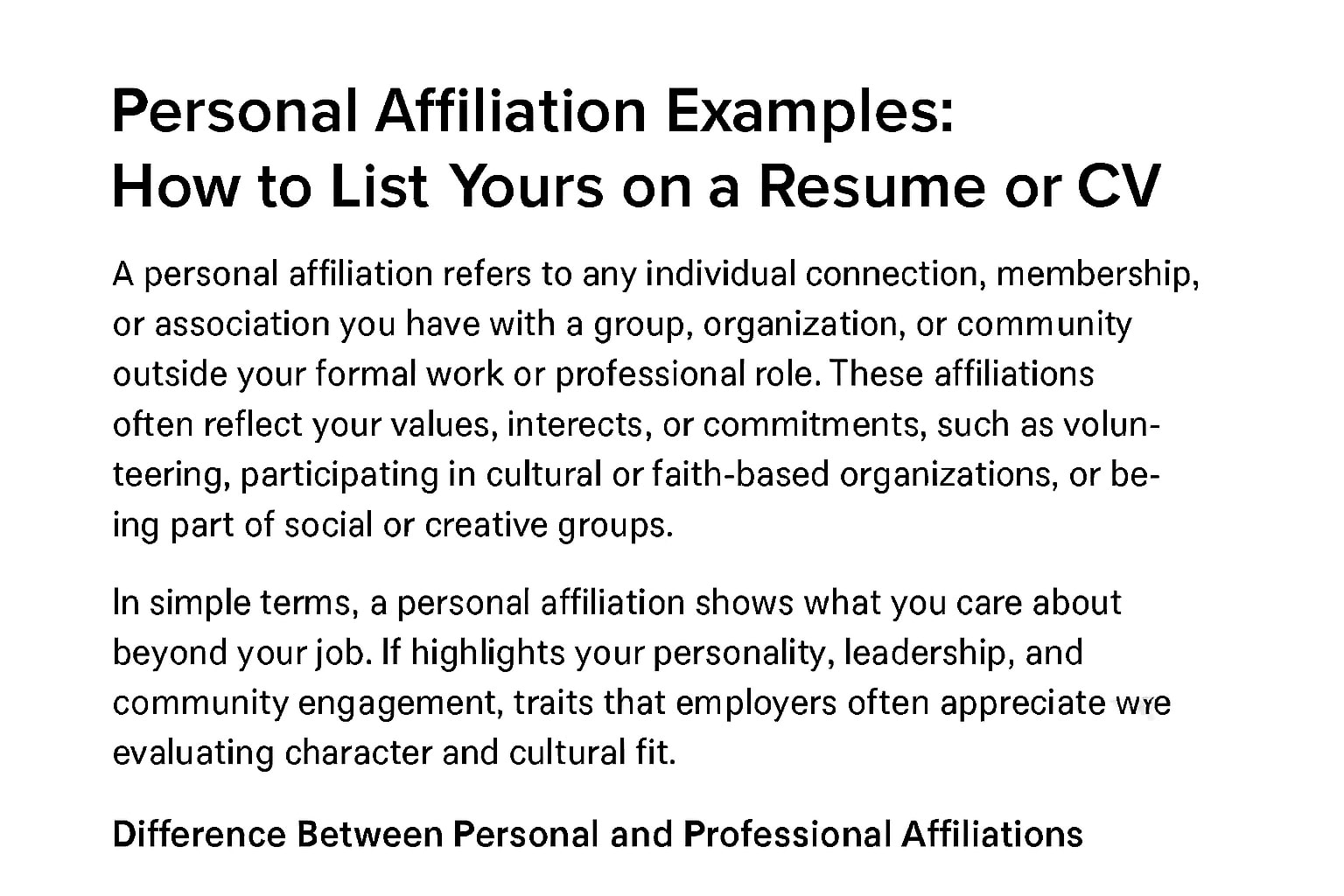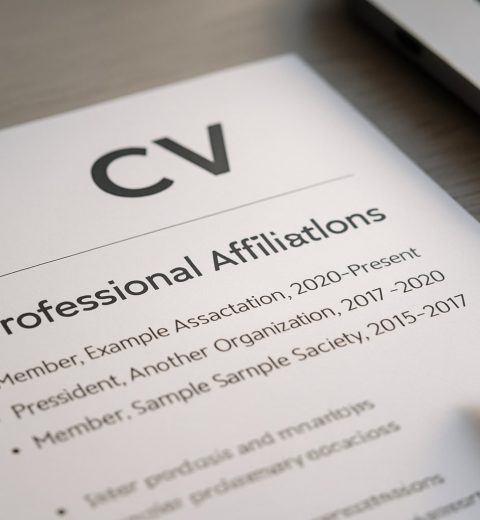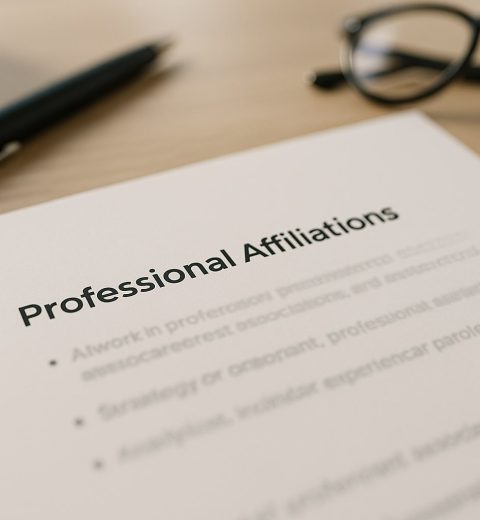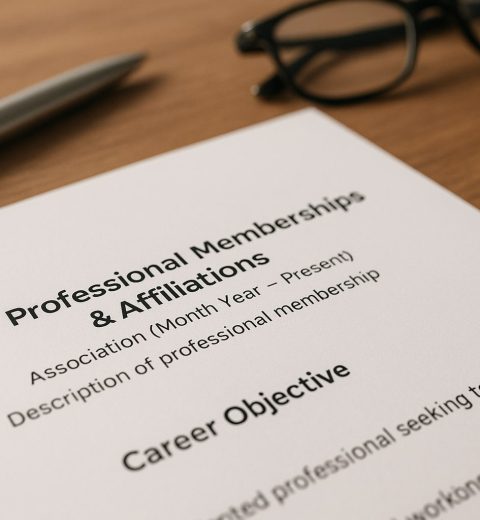A personal affiliation refers to any individual connection, membership, or association you have with a group, organization, or community outside your formal work or professional role.
These affiliations often reflect your values, interests, or commitments, such as volunteering, participating in cultural or faith-based organizations, or being part of social or creative groups.
In simple terms, a personal affiliation shows what you care about beyond your job. It highlights your personality, leadership, and community engagement, traits that employers often appreciate when evaluating character and cultural fit.
Difference Between Personal and Professional Affiliations
While they may sound similar, personal and professional affiliations serve different purposes on a resume or CV:
| Aspect | Personal Affiliation | Professional Affiliation |
|---|---|---|
| Focus | Reflects individual interests, community service, or social engagement. | Shows formal connection to an industry, professional body, or trade organization. |
| Examples | Volunteering at a local charity, leading a youth group, or joining a cultural club. | Membership in the Project Management Institute (PMI) or Chartered Institute of Marketing (CIM). |
| Purpose | Highlights character, values, and transferable soft skills. | Demonstrates career credibility, certification, and ongoing professional development. |
| When to Include | When it aligns with your professional values or adds depth to your story. | When it validates your qualifications and field expertise. |
Both can strengthen your resume. The key is knowing when and how to include them.
Still unsure of the difference? Read our breakdown of the professional affiliation meaning.
When Personal Affiliations Matter
Personal affiliations are especially valuable when they reinforce your professional identity or soft skills. Consider adding them when they:
- Demonstrate leadership or teamwork (e.g., organizing events, mentoring others).
- Reflect values that align with the company’s mission (e.g., community engagement or sustainability).
- Illustrate initiative, creativity, or empathy, which may not appear in your job experience.
- Help fill gaps in experience, particularly for students, career changers, or early-career professionals.
For example, if you volunteer with an environmental organization and are applying for a sustainability-related role, that personal affiliation adds real credibility and connection to your application.
Pro Tip
Use personal affiliations to show who you are beyond your qualifications. Employers don’t just hire skills, they hire people whose values, mindset, and community engagement reflect leadership and character.
Why Personal Affiliations Can Strengthen Your Resume
Personal affiliations go beyond hobbies or interests. They reflect your character, leadership potential, and sense of community. Employers today look for candidates who not only have technical skills but also demonstrate integrity, initiative, and a strong alignment with company values.
When chosen carefully, personal affiliations can make your resume more human, relatable, and memorable.
1. They Show Character and Integrity
A well-chosen personal affiliation highlights who you are beyond your job title. It shows that you value teamwork, social responsibility, or lifelong learning, all traits that employers appreciate.
For example, being part of a community mentorship group or volunteering at a local NGO reveals commitment, empathy, and consistency; qualities that build trust in a professional setting.
These subtle details help recruiters understand your values and motivations, not just your qualifications.
2. They Demonstrate Leadership and Initiative
Employers often associate strong affiliations with leadership and proactivity.
If you’ve led an initiative, organized an event, or coordinated community programs through your affiliations, you’re already showing skills that translate directly into the workplace.
For instance:
- Chairperson — Youth Empowerment Forum (2022–Present): Demonstrates strategic leadership and people management.
- Volunteer Coordinator — Local Food Bank: Reflects organizational and communication skills.
Even small roles can indicate initiative and responsibility, especially for early-career candidates or students.
3. They Reflect Community Values and Cultural Awareness
Personal affiliations often reveal a sense of social responsibility and inclusion. In global and multicultural workplaces, this matters more than ever.
For example, participation in:
- Environmental advocacy groups can show commitment to sustainability.
- Cultural associations may signal diversity awareness.
- Humanitarian organizations highlight empathy and teamwork.
These examples of personal affiliation connect your individual story to broader social and cultural values, an attractive quality for purpose-driven companies.
4. They Highlight Transferable Soft Skills
Many personal affiliations naturally develop soft skills that employers seek but can’t always measure through experience alone.
Here are a few transferable skills your affiliations might demonstrate:
| Skill | How It’s Demonstrated Through Personal Affiliation |
|---|---|
| Leadership | Chairing a local club, mentoring youth, or organizing community events. |
| Teamwork | Collaborating in volunteer projects or cultural groups. |
| Communication | Public speaking, coordinating programs, or fundraising activities. |
| Organization | Planning charity drives, events, or club meetings. |
| Empathy & Cultural Awareness | Working with diverse groups in nonprofit or faith-based settings. |
Including these kinds of affiliations helps employers envision your contribution to their workplace culture, not just your technical expertise.
5. When Personal Affiliations Are Most Relevant
You should include personal affiliations when:
- You’re a student or recent graduate with limited work experience.
- The role emphasizes community involvement or corporate social responsibility.
- The affiliation aligns with the employer’s mission or values.
- It demonstrates a transferable skill valuable to your target position.
In such cases, personal affiliations can be the difference between a generic application and a memorable one.
Pro Tip
Use personal affiliations as strategic storytelling tools. They don’t just fill space, they illustrate who you are, how you think, and how you lead. The right affiliation can quietly reinforce your professional narrative and cultural fit.
Personal Affiliation Examples
Choosing the right personal affiliations for your resume or CV can help you demonstrate more than just job experience; they show your commitment, leadership, and community values. The key is to select affiliations that align with your personal growth and professional direction.
Below are categorized personal affiliation examples you can adapt for your own profile.
1. Volunteer and Community Groups
Volunteering reflects empathy, leadership, and initiative; qualities employers respect in any industry.
If you’ve contributed to community causes or nonprofit organizations, list those under a “Community & Personal Affiliations” section.
Examples:
- Volunteer — Kenya Red Cross Society (2021–Present)
- Member — Habitat for Humanity Kenya (2020–Present)
- Coordinator — Local Food Donation Drive, Nairobi (2022–Present)
- Volunteer — Wildlife Conservation Trust, Kenya (2019–2021)
- Mentor — Youth Empowerment Program, Mombasa (2023–Present)
These personal affiliation examples communicate responsibility, compassion, and leadership, especially valuable in people-focused or social-impact careers.
2. Cultural, Faith-Based, or Social Organizations
Affiliations in cultural or faith-based groups can highlight your integrity, cultural awareness, and ability to work in diverse environments.
However, always keep such listings neutral and inclusive, focusing on your role or impact rather than ideology.
Examples:
- Member — Cultural Heritage Association of Kenya (2020–Present)
- Organizer — Annual Interfaith Community Dialogue (2021–2023)
- Volunteer — Faith-Based Youth Outreach, Nairobi (2019–2022)
- Member — Swahili Cultural Preservation Group (2021–Present)
- Choir Coordinator — St. Andrew’s Community Church (2020–2022)
These affiliations show community involvement and cross-cultural collaboration, making them ideal for roles requiring teamwork or public engagement.
3. Alumni or Mentorship Networks
Affiliations with academic or alumni groups demonstrate long-term commitment, mentorship, and connection to professional development.
They’re particularly valuable for early-career professionals and graduates.
Examples:
- Member — University of Nairobi Alumni Association (2020–Present)
- Mentor — Strathmore University Alumni Network (2021–Present)
- Member — IEEE Student Chapter, JKUAT (2022–Present)
- Volunteer — Alumni Career Guidance Initiative (2023–Present)
- Co-Founder — College Women in STEM Network (2021–Present)
Such examples of personal affiliation demonstrate loyalty, mentorship, and contribution, all indicators of personal growth and engagement.
4. Clubs, Interest Groups, or Creative Communities
Clubs and interest-based affiliations can help you showcase your personality, creativity, and transferable soft skills, especially communication, planning, and leadership.
Include only those that demonstrate initiative, organization, or teamwork.
Examples:
- Co-Founder — Nairobi Photography Club (2020–Present)
- Member — Book Lovers Community Kenya (2021–Present)
- Organizer — Local Theatre & Performing Arts Group (2022–Present)
- Member — Digital Creators Collective Kenya (2021–Present)
- Coordinator — Hiking and Nature Conservation Group (2023–Present)
These kinds of personal affiliation examples humanize your profile, making you appear approachable, balanced, and community-oriented.
Pro Tip
Focus on impact, not just participation. Employers are more impressed by what you did within an affiliation, such as leading, mentoring, or organizing, than by the name of the group itself.
When in doubt, ask yourself: “Does this affiliation show a skill, value, or quality that supports my professional story?” If yes, include it.
When to Avoid Listing Personal Affiliations
While personal affiliations can add warmth and depth to your resume, not every membership or connection belongs there.
Some affiliations may be too personal, outdated, or irrelevant, and could distract from your professional strengths.
Knowing what to leave out is just as important as knowing what to include.
1. Political or Religious Sensitivities
Even if these affiliations have shaped your leadership or community involvement, political and religious groups can sometimes introduce unconscious bias during the hiring process.
Unless they are directly relevant to the job or demonstrate measurable skills, it’s best to keep them off your resume.
Avoid:
- Member — National Political Party Branch
- Volunteer — Religious Advocacy Group
Better:
- Volunteer — Local Community Service Program (focused on education, health, or sustainability)
Keep your resume neutral and inclusive. Employers should focus on your skills and potential, not personal beliefs or ideologies.
2. Irrelevant or Outdated Memberships
Listing memberships that ended years ago or that no longer align with your goals can make your resume look outdated.
A personal affiliation should show who you are now, not what you did a decade ago.
Avoid:
- Member — High School Debate Club (Graduated 2012)
- Volunteer — Local Art Camp (2010–2013)
Better:
- Member — Nairobi Creative Arts Collective (2022–Present)
- Volunteer — Community Literacy Drive (2023–Present)
If the affiliation no longer represents your current skills, interests, or direction, remove it to keep your resume focused and fresh.
3. Informal or Social-Only Clubs
Social groups and casual clubs are wonderful for connection, but they usually don’t add professional weight to a resume.
Avoid listing affiliations that don’t show leadership, collaboration, or relevant skills.
Avoid:
- Member — Weekend Movie Fans Group
- Participant — Gaming Meetup Circle
Better:
- Organizer — Nairobi Film Enthusiasts Forum (Led monthly workshops on cinematography)
- Co-Founder — Digital Creators Collective Kenya
The distinction lies in purpose and impact: if your involvement helped others, built a skill, or contributed to a cause, it’s worth listing.
Pro Tip
Think of your affiliations as career amplifiers, not personal disclosures. Each one should tell a story that supports your professional image, current, relevant, and bias-free.
If an affiliation doesn’t align with your target role or reflect your growth, it’s better left out.
How to Include Personal Affiliations in a Resume or CV
When adding personal affiliations to your resume or CV, the goal is to present them professionally and clearly.
You want employers to see community involvement and transferable skills, not just personal interests.
The right structure and wording can make your affiliations a genuine asset to your career story.
1. Choose the Right Section Title
If your affiliations blend professional and personal memberships, use a section heading that reflects both.
Good examples include:
- Community & Personal Affiliations
- Professional & Personal Memberships
- Affiliations and Volunteer Involvement
- Community Engagements
- Memberships & Associations
Choose the label that fits naturally within your resume layout, usually placed after Work Experience or Education.
2. Follow a Clear, Consistent Format
Each entry should include:
- Organization name (e.g., Red Cross Society, Nairobi)
- Your role or position (e.g., Volunteer, Member, Organizer)
- Dates of involvement (optional but recommended)
- Brief description or achievement (showing contribution or leadership)
Use concise bullet points, just like other resume sections.
Keep descriptions short, ideally one line per affiliation.
3. Example Resume Snippet
Here’s a sample affiliation example in a resume to model your format:
Community & Personal Affiliations
- Volunteer — Kenya Red Cross Society (2022–Present)
Participated in regional blood donation campaigns and disaster response initiatives. - Member — Nairobi Cultural Heritage Association (2021–Present)
Promotes local art exhibitions and cultural education programs. - Mentor — University of Nairobi Alumni Network (2020–Present)
Guide final-year students on career planning and transition to employment.
Professional Memberships
- Member — Marketing Society of Kenya (MSK) (2022–Present)
Engage in workshops on digital marketing trends and ethical advertising standards.
This layout cleanly separates personal affiliations from professional memberships, giving your resume structure and readability.
4. Where to Place It on the Resume
- If you’re a student or recent graduate, place it below Education, since affiliations often highlight early leadership or volunteering.
- For mid-career professionals, position it after Work Experience or Skills, where it adds depth and community engagement.
- For executives or specialists, place it near the end as a supporting section that reinforces professional credibility and personal balance.
Pro Tip
Always highlight impact over involvement.
Employers value what you achieved or contributed, not just the fact that you were a member. Use strong action verbs such as organized, led, supported, facilitated, or mentored.
See exactly how to list professional memberships on your resume.
Final Thoughts on Personal Affiliations
Personal affiliations might seem secondary to your work experience, but when chosen thoughtfully, they tell a deeper story, one of community, leadership, and character.
They show that your growth extends beyond the office and that you bring values-driven engagement to your professional life.
When adding personal affiliations to your resume or CV, remember these key takeaways:
- Be selective: Include only affiliations that reflect positively on your skills, credibility, and personal growth.
- Show impact: Mention leadership roles, mentorships, or tangible contributions, not just memberships.
- Keep it current and relevant: Focus on affiliations that align with your present goals and professional direction.
- Stay neutral: Avoid affiliations that could introduce bias or controversy.
By presenting your personal affiliations with clarity and purpose, you help employers see a well-rounded, engaged, and dependable candidate, someone who contributes to both their profession and community.
Still unsure how to balance personal and professional affiliations?
Read our full guide on professional affiliation meaning to clarify the difference and make your resume stand out with authenticity and focus.
Need practical samples? Check out these professional affiliation examples and templates




